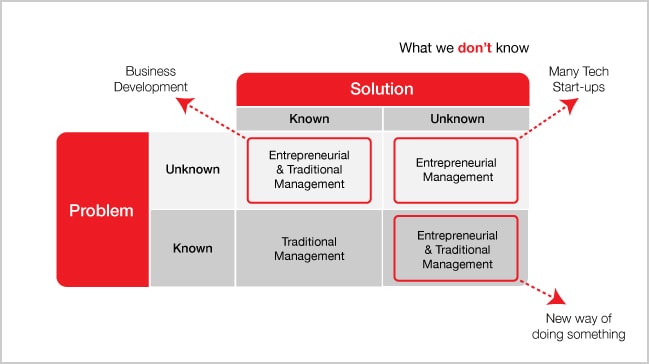Today, engineering entrepreneurs are changing the world at an unprecedented speed. The slight irony is that, in this age of unprecedented technology driven change, in the UK the main protagonists are often not regarded as engineering companies. Think Google, Apple and Facebook.
Nonetheless, technology and innovation have never been so important to so many people.
However, whilst the abilities of companies to manipulate technology reach new heights, it’s often the market equation where things are lacking. We’ve all heard the phrase “… a solution looking for a problem to solve …”, and Gilbert K. Chesterton sums it up “… It isn’t they can’t see the solution. It is that they can’t see the problem …”. Multiple studies show that 80% of all new product launches fail, as do 80% of new businesses. This challenge is made all the more difficult by the increasing efficiency of a globalised competitive market.
Similarly, an optimal technical solution is often less successful than an inferior competitor, or fails entirely. Think of the superior Betamax overwhelmed by VHS, OS/2 beaten by Windows, DAT by CDs, and the failures of Iridium satellite telephony, virtual reality and 3D TV. Now, we can sometimes blame this on factors such as the competitor having a bigger advertising budget, but is there often something else going on? I think there often is.
We all acknowledge the value of market research to help steer product development. But what do you do if the market analysis is wrong? What if the rate of change and innovation is so fast that the research methodology genuinely can’t give you the answer? The risk is then proceeding on a faulty premise, with the inherent risks and reliance on luck that implies.
For me, Entrepreneurship is defined as the acts of acknowledging and managing these forms of uncertainty within a business. In today’s rapidly changing environment, with brief competitive advantages, entrepreneurship is equally applicable to large innovative corporations as to start ups.
Entrepreneurship is emerging as a distinct set of commercial skills and techniques. Phrases such as ‘lean start up’ and ‘minimum viable product’ are entering everyday parlance. These techniques were devised for, and are particularly suitable to, the vagaries of technology innovation.
Business schools use the Ansoff matrix tool to demonstrate the problem: If you imagine a 2x2 matrix. The x axis has 2 categories, ‘known solution’ and ‘unknown solution’. The y axis ‘known problem’ and ‘unknown problem’.

Much of traditional product development sits in the quadrant ‘known problem, known solution’. Here, innovation is usually an iteration of established products and patterns.
The ‘unknown problem but known solution’ quadrant is exemplified by taking an established product into a new market, which then interprets the product in an entirely different and sometimes unpredictable way.
The ‘known problem but unknown solution’ quadrant is a new way of doing something.
Then there’s the ‘unknown unknown’ box. There is no precedent for the innovation because it is brand new. It never existed before. It’s hard to judge how it may be interpreted, what market relationships it could form. This is where the hidden rocks ready to sink an endeavour often lie. It’s also the purest example of the challenges of technology innovation, and is most often seen in technology start ups.
These last 3 quadrants require a different set of business tools, rather than traditional management.
I’m very much in favour of introducing commercial and business skills earlier in the training of engineers. It seems in the past we have introduced these skills only in specialised degrees, or in the workplace, but only to those who stray from the pure technical path. I would argue that in the accelerated fluxes of tech and business that we can no longer afford this luxury. I would also argue that exposure to business skills and the market makes for better engineers and stronger businesses.
Nottingham University Business School runs an undergrad business plan competition and I’m gratified how often I see teams of engineers outperform their business study peers. There’s something innate in engineering training that enables the analysis of tradeoffs and a focus on deliverables. This alchemy is all the more potent when combined with business, and particularly entrepreneurship, skills.
Here’s a key question: How do we introduce these concepts and the accompanying commercial skills? In our university programs? Or are the curricula already too full? Do we throw something out? Or do engineers need to lead the way? I know I went out of my way to pursue these skills.
In any case, we first need to recognise how vital it is. This much is certain - the pace of change is increasing, the challenge evolving, and if we are even a little bit slack, the world will move on without us.
- SMF was founded over 25 years ago by Lord Sainsbury as a philanthropic endeavour to encourage better management skills in UK engineering. The SMF charity is currently funded by Lord Sainsbury via the Gatsby Charitable Foundation and has no link whatsoever with the supermarket chain.





Swiss geoengineering start-up targets methane removal
No mention whatsoever about the effect of increased methane levels/iron chloride in the ocean on the pH and chemical properties of the ocean - are we...